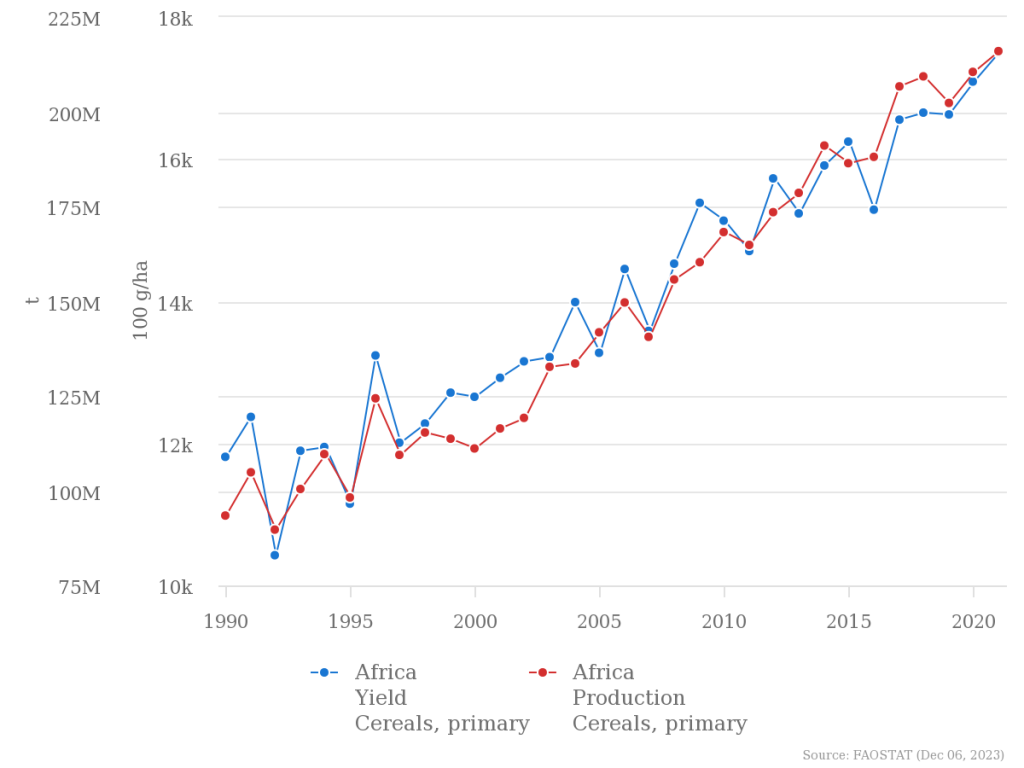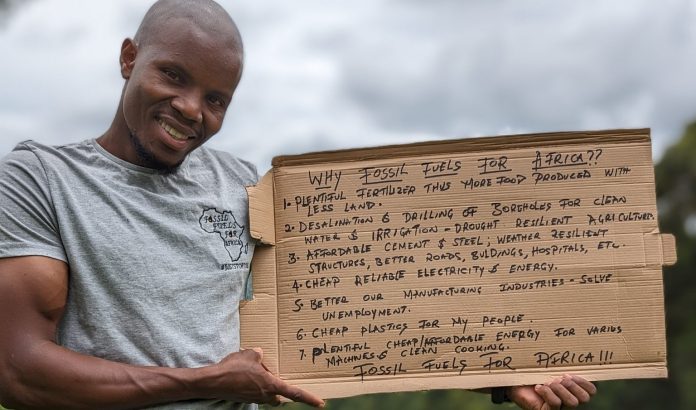The BBC recently published a hit piece posing as an article attacking a Kenyan farmer who has developed a modest following on X, for his skeptical view of climate alarm claims, and his experienced based understanding that Africans need and deserve to develop fossil fuels. The farmer, Jusper Machogu, is right. In reality, it is the BBC’s “climate change misinformation” reporter who is misleading readers. Not only is the target of the hit piece correct that fossil fuels would be good for Africa, but the BBC reporter’s assertion that Africa is uniquely battered by climate change is false.
The BBC’s Marco Silva wrote the article, “How a Kenyan farmer became a champion of climate change denial,” covering the social media activity on X of a young Kenyan farmer and agricultural engineer, Jusper Machogu, who strongly supports and frequently posts that apocalyptic climate change claims are false and about fossil fuel development for Africa.
Machogu’s post history mostly involves him advocating for the mechanization and modernization of farming in Africa, enthusiastically praising synthetic fertilizers, tractors, and other production-boosting technologies that are made possible by fossil fuels and their derivatives. He has extensive knowledge about agriculture, including why “green” methods of farming and fertilizer production are nowhere near as effective as the processes involving fossil fuels.
The fact that African agriculture has benefitted from the use of fossil fuels has been covered at Climate Realism extensively.
Silva warns ominously that Machogu is a “flagbearer for fossil fuels in Africa, but there is more to his campaign than meets the eye,” accusing him of being motivated exclusively by financial gain to post “debunked theories about climate change[.]” Silva’s evidence of this is that Machogu got a whopping $9,000 over the course of two years in donations, “some of which came from individuals in Western countries linked to fossil-fuel interests.” This is just scummy on the part of Silva, an ad hominem attack on Machogu’s character and possible motivations rather than the content of his posts.
Silva doesn’t attempt to engage with Machogu’s claims that “there is no climate crisis,” except to cite specific experts who disagree. Machogu has written that his research has led him to believe that climate change is mostly natural, posting on X ““Climate change is mostly natural. A warmer climate is good for life,” to which Silva blithely responds that Machogu, “wrongly claimed in a tweet posted in February, along with the hashtag #ClimateScam (which he has used hundreds of times).” Silva cites no evidence for his claim that Machogu’s claims about climate change being natural and a warmer world being good for life are wrong — where’s his proof? That, of course, would have been to engage in facts rather than deploying smarmy rhetoric.
The problem for Silva is, as Climate Realism has shown in hundreds of articles, there is no evidence whatsoever that climate change is making the world worse for humanity. In fact, people are living longer, more food is being produced, the earth is greening, and fewer people are dying from extreme weather and non-optimum temperatures than ever in history. In short, data strongly suggests that it is the poor farmer rather than the educated journalist who is right about climate change, a warmer climate is good for life. Once again, rather than disputing Mochogu’s claims with data, Silva then parrots a talking point that Africa is particularly vulnerable to climate change and its alleged effects “including more intense and frequent heatwaves, prolonged droughts, and devastating floods.” He provides no proof for these claims, either, because there is none.
Computer model projections may predict that Africa might someday suffer ill effects from climate change, and propagandist journalists may promote the idea every time some part of the continent is suffering from extreme weather, but real world data debunk such claims. The bulk of evidence show that Africa is not suffering from worse or more prolonged heatwaves, drought, or flooding, as covered in several posts by Climate Realism.
Machogu is also correct that greater fossil fuel development and use would benefit poor African nations, so long as they get to reap the benefits of having the products and energy security that fossil fuels provide, instead of having African fossil fuels exploited by corrupt governments or shipped off to energy-hungry Western nations. Silva attempts to head off this obvious point by quoting a Ugandan climate activist, writing that “fossil fuel exploration has not always been a synonym for growth and development in Africa.”
But this does not address the point at all. Just because some development has been exploitative doesn’t mean that Machogu is wrong.
Trying to stop Africans from using cheap, plentiful energy from fossil fuels makes it more difficult, if not impossible, to adapt to natural weather disasters. Similarly, as Machogu, who actually lives in a region where so-called “sustainable” farming practices dominate, points out, organic and non-mechanized farming are all fun and games when your life does not depend on it, but give lower yields and increase the threat of famine, as it did in Sri Lanka.
Modern synthetic fertilizers and fossil-fuel powered equipment have already helped African nations’ food production increase over time, reducing hunger and malnutrition, regardless of extreme weather events, as discussed here, here, and here. For a specific example, see African cereal yield data from the U.N. Food and Agriculture Organization since just the 1990s. (See figure below)
Over the same period which has seen the most climate alarmism amid modest warming:
- Cereal production rose 131 percent;
- Yield rose 48 percent;
- New all-time production records have been 7 times between 2011 to 2021.

To get an idea even further of the kind of dishonesty and underhanded tactics employed by Silva in his thread, take a look at this quote:
“When we spoke, Jusper told me his beliefs are shared by many people in Africa, but I found that most users engaging with his X account are actually based in the US, the UK, and Canada,” Silva wrote.
This is an obvious bait and switch that anyone with a functioning brain can see. Jusper Machogu has lived experience, every single day, with African sustenance farming communities outside of social media. There are far more Westerners with daily internet access than there are Africans that do; ironically, the former being yet another result of the Western world’s fossil fuel-based infrastructure.
It’s also worth noting the projection coming from Silva. While he suggests that Machogu’s opinions are bought and paid for, Silva himself advertises the fact that he is part of a propaganda network called the Oxford Climate Journalism Network, a Reuters Institute project and one of many similar networks that are supposed to increase the “impact” of climate coverage in the news. They are an activist organization, founded to hype alarming climate claims. Given the lack of honesty, journalistic rigor, and underhanded tactics employed by Silva, that organization and those like it should be ignored or avoided by anyone who values factual reporting and integrity.
This is what we call punching down; a comparatively wealthy western journalist working for one of the biggest news organizations on the planet targeting a single man with a modest following on X.
Perhaps, what alarms Silva the most is that Machogu’s beliefs about the benefits of fossil fuel development in the face of Western hostility to the same is gaining currency in Africa. Silva writes:
“We need fossil fuels to develop our Africa,” Mr Machogu tweeted last year.
This view appears to be shared by some African governments, who have given their go-ahead to new oil and gas projects despite pledging to “transition away” from fossil fuels.
Leaders like Ugandan President Yoweri Museveni have argued that it is hypocritical for Western nations to impose restrictions on African states, when they have become rich from fossil fuels.
Silva bemoans the fact that African nations are increasingly not towing the Western world’s party line on the dangers of fossil fuels and the need to eschew their use.
Machogu is clearly a threat to mainstream climate propaganda because he comes from the nations the Western world it trying to shut out of fossil fuel use, making them permanent vassal states dependent on foreign aid. He knows from experience the problems poor African farmers face, and he knows that climate change is not significant among them, while paternalistic green colonialism is. Mochogu should be applauded for daily showing the reality of living without access to fossil fuels and battling bravely for the development of those resources despite the constant pressure from foreign interests, many of them former colonial powers and their lickspittles in the mainstream media like the BBC, to remain underdeveloped.



















Delightful commentary, thank you for writing this piece. Machogu is apparently hiding his avaricious evil behind a kind smile and rational thought as demonstrated on a Sharpie laden piece of cardboard.